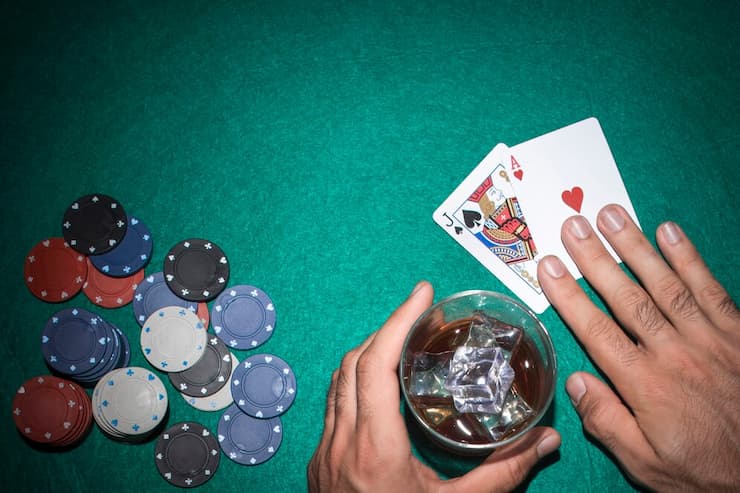

What is gambling addiction? Also known as problem gambling, it affects millions worldwide, with research indicating that about 2-3% of… Continue reading Gambling Addiction Facts – Understanding Problem Gambling
The post Gambling Addiction Facts – Understanding Problem Gambling appeared first on ReadWrite.

What is gambling addiction? Also known as problem gambling, it affects millions worldwide, with research indicating that about 2-3% of gamblers experience severe issues. As this entertainment shifts to digital space, understanding gambling addiction facts and statistics is crucial for ensuring a safe user experience when trying your luck online.
Problem gamblers can experience significant financial, emotional, and social challenges. To that end, we should explore the factors contributing to this addiction, as well as strategies for effective management.
Gambling addiction is a behavioral disorder where an individual experiences an uncontrollable urge to gamble despite its negative impact on their life. This addiction can lead to significant financial problems, emotional distress, and strained relationships.
Unlike casual gamblers, who can walk away after playing, those with gambling addiction often feel compelled to chase losses or gamble with increasing stakes. This relentless pursuit can lead to severe consequences, including debt, job loss, and mental health issues.

Speaking of gambling addiction facts, we should start off by mentioning it is a non-substance addiction. It’s rooted in the anticipation and excitement of potential wins rather than a chemical dependency on drugs or alcohol.
However, similar to substance addiction, gambling problems involve compulsive behaviors that trigger psychological dependencies. It becomes addictive due to the brain’s reward system, which releases dopamine when a person wins, creating a euphoric feeling.
As a result, those with a gambling disorder obsessively chase this high. They constantly think about wagering money and fall victim to common gambling fallacies. So it can be as destructive as substance abuse. It causes significant emotional, financial, and social harm and destroys personal relationships.
One common trigger of problematic gambling behavior is stress, where individuals turn to sports betting or casino games as an escape from personal or professional pressures.
The need for excitement is another powerful trigger; high stakes bets and risky games offer the thrill and adrenaline rush that some people crave in their daily lives.
Feelings of loneliness or boredom can also drive people to gamble as a form of social interaction or entertainment. Additionally, depression and anxiety may lead individuals to gamble as a coping mechanism.
If you want to learn how to help someone with gambling addiction, recognizing the signs and gambling addiction symptoms will be helpful. Ideally, you can identify symptoms before they progress into a full-blown disorder.
Here are some key indicators of problem gambling in a person, according to the American Psychiatric Association:
One aspect of this entertainment industry that helps offset its negative consequences to communities and individuals is the impact it has on the economy. While the gambling industry contributes to economic growth through revenue and job creation, gambling addiction also brings some negative consequences to communities and individuals.
Here’s an overview of how gambling affects American society through gambling addiction statistics.
The industry is a substantial economic contributor, with the commercial casino industry generating $66.5 billion in gross gaming revenue in 2023 alone, a 10% increase from 2022’s $60.5 billion, as reported by the American Gaming Association.
Gambling establishments also provide jobs for over 1.7 million Americans, including positions in casinos, racetracks, and online gaming platforms, while popular gambling destinations such as Las Vegas and Atlantic City attract millions of tourists annually.
One more fact about gambling addiction is that a big portion of the revenue actually comes from players with gambling disorders. Although it is difficult to get accurate data on the matter, a study conducted in 2016 University of Lethbridge, Alberta, suggests that between 15% and 50% of gambling revenue comes from problem gamblers.
Though it seems shocking at first, it isn’t too far-fetched. After all, the Pareto Principle, or the 20/80 rule, suggests the top 20% of clients of any business account for 80% of the revenue.
The National Council on Problem Gambling (NCPG) estimates that approximately 2.5 million U.S. adults (about 1% of the population) meet the criteria for severe gambling addiction. Additionally, another 5-8 million adults experience mild to moderate gambling problems.
It’s one of the better-known gambling addiction facts that its consequences extend way beyond the individual. Families of problem gamblers often face emotional and financial turmoil, leading to damaged relationships and even domestic violence.
Continuing to explore facts on gambling addiction, it’s well documented that besides the financial incentive, gambling has a solid social aspect to it. We found another study that reports that around 20% of gamblers actually cite socialization as a key motivator for their gambling activities.
Gambling companies often engage in fundraising efforts to support various charitable causes. In the U.S., the American Gaming Association reports that casinos have collectively contributed millions to local charities and community initiatives.
One of the first signs of gambling addiction is when it starts interfering with one’s day-to-day life. In other words, when one’s personal relationships, finances, and/or mental well-being deteriorate. If the individual starts to feel the need to play more often or with even higher stakes to achieve excitement, those are clear warning signs.

Constantly thinking about gambling, having mood swings, and borrowing money to play more are also serious indicators of addiction.
Certain groups are more vulnerable to developing gambling addiction due to various risk factors such as social, economic, and psychological influences.
According to gambling addiction statistics, young adults and teenagers are vulnerable groups because of their tendency to engage in risk-taking behaviors. Genetic factors are also at play. Individuals with a family history of addiction may also be more susceptible due to genetic predispositions and learned behaviors.
People experiencing financial stress might turn to gambling as a perceived solution to their money problems. Additionally, those with mental health issues like depression or anxiety may gamble to escape their emotional distress, increasing their risk of developing a gambling disorder.
Older adults, who may face loneliness and boredom, might opt for gambling to socialize with other fans of this hobby.
Minors can indeed develop gambling problems. Adolescents are naturally more inclined to engage in risk-taking behaviors. Being exposed to it from an early age can fuel problematic behavior down the line, which can turn into a full-fledged disorder down the line.
Social factors like peer pressure and family environment can also play a significant role. What’s more, they are exposed to gambling-like elements, such as loot boxes, through regular AAA and gacha games.

So far, we’ve mentioned online gambling addiction facts in broad strokes, sort of speaking. The reality is there are different forms of gambling entertainment, and they don’t affect one’s psyche in the same way. Some are more while some are less addictive.
The industry is responsible for providing a safer gaming environment and clear information about the risks associated with gambling. They also need to promote responsible gaming practices along with gambling addiction resources like gambling addiction helpline numbers and self-exclusion options.
Luckily, this is something that the safest online casinos already do. What’s more, they strive towards ethical marketing practices and they avoid targeting vulnerable groups.
That said, more can be done. In some instances, operators over glamourize the hobby, which is a big no.
Additionally, brands need to be more proactive and support the research of treatment programs. This can create an even safer environment or at least provide better treatment options for those affected by this addiction.
The psychology of gambling addiction often involves high levels of stress and anxiety. After all, individuals worry about their financial situation and the consequences of their gambling behavior. This stress can lead to feelings of hopelessness and depression.
Emotionally, gambling addiction creates a cycle of highs and lows, where the thrill of playing temporarily alleviates negative feelings. However, it ultimately leads to greater emotional distress. Individuals may experience mood swings and irritability when they aren’t playing, as both of these are common withdrawal symptoms.
So, how to stop gambling addiction? By implementing these strategies, individuals, communities, and the industry itself can work together to minimize the risks associated with this addiction.
When discussing addiction to gambling, facts are as follows; healthy limits and maintaining a balanced approach are crucial in preventing gambling disorder. Nowadays, operators have responsible gambling tools that you can use to set spending limits and learn exactly how much you’ve lost. Not only can this prevent you from overspending it also prevents you from lying to yourself about your losses.
Additionally, many of the legitimate or regulated operators offer self-exclusion tools. Players can still play for real money, but they can also voluntarily block themselves from accessing gambling sites for a specified period. These tools can be invaluable for those struggling to control their gambling.
Education programs in schools can provide gambling addiction resources and teach students about the potential risks of gambling. Encouraging parents to discuss gambling openly with their children is essential. Educating them on some facts on gambling addiction will help demystify the activity and create awareness about its dangers.
Stricter regulations on gambling advertising can also reduce exposure to young audiences, limiting the normalization of this hobby. Moreover, providing access to gambling addiction counseling and support services for at-risk youth ensures they can seek help.
Recovering from gambling addiction involves a comprehensive process that combines psychological, social, and medical support. The first step is often acknowledging the problem and seeking professional help.
Therapy options like cognitive-behavioral therapy (CBT) are effective in changing harmful thought patterns. Support groups, such as Gamblers Anonymous, offer community and shared experiences that can be incredibly helpful.
Here’s a step-by-step guide to help individuals break free from gambling addiction:

One key strategy is to establish a robust system and to find sustainable support networks. A sense of community and belonging is very effective for managing temptations and for maintaining strong willpower to avoid bad habits.
Another essential strategy for sustained recovery is to set and work toward personal goals unrelated to gambling. This could involve focusing on career advancement, education, or personal development. The idea here is to shift focus away from gambling and foster a sense of purpose.
Additionally, maintaining a balanced lifestyle with regular physical activity, healthy eating, and rest improves overall well-being and reduces the desire to gamble. It’s also crucial to continually evaluate and adjust one’s financial habits.
It’s important to express understanding and empathy while avoiding judgment, as this promotes an open environment for communication. Encourage the individual to seek professional help and attend support groups, offering to join them if they’re comfortable.
Alternatively, do not enable their gambling by lending money or covering debts, as this can perpetuate the addiction. Instead, help them set financial boundaries by controlling access to funds if needed.
Finally, prioritize self-care and seek support for yourself to maintain a healthy and balanced relationship during the recovery process.
As stated, seeking professional help is crucial for effective recovery. Cognitive-behavioral therapy and counseling offer structured support and guidance to address the underlying issues contributing to the addiction.
Additionally, family therapy may be beneficial in repairing strained relationships and creating a supportive home environment. Experts can provide the necessary tools and support for individuals to regain control over their lives and maintain recovery from pathological gambling.
You may not have known that some of the most quoted facts about gambling addiction are actually not factual at all. Let’s debunk some of the most common myths posing as gambling addiction facts:
Reality: Gambling addiction affects more than just finances; it can lead to emotional distress, relationship issues, and mental health problems. Even if an individual hasn’t experienced financial ruin, excess gambling can still disrupt their life significantly.
Reality: Gambling addiction is a complex disorder influenced by genetic, environmental, and psychological factors. It’s not simply a matter of willpower. Professional treatment and support are often necessary to overcome the addiction.
Reality: Anyone can develop a gambling problem, regardless of age, gender, or socioeconomic background. Factors like stress, mental health issues, and access to gambling opportunities play significant roles.
Reality: Gambling addiction is recognized as a behavioral addiction by the American Psychiatric Association, much like substance addictions. It involves compulsive behavior and changes in the brain’s reward system similar to those seen in drug addiction.

Occasional gambling is typically not concerning. After all, this is a widely popular hobby across the globe, and almost 26% of the adult population are occasional or casual gamblers. In fact, there are millions who use sweepstake casinos, which don’t even have real money rewards.
Long story short, so long as you are not overspending and playing extensively, there is nothing to worry about. At the end of the day, this is what gambling should be, a harmless form of entertainment. What’s more, legitimate casinos and sportsbook brands will promote responsible playing practices.
So, if you do find yourself gambling, make sure to do it at licensed, reputable online casinos. Opt for platforms that promote responsible gambling and feature helpful welcome offers and bonuses that can let you play without straining your bankroll too much. By working together, individuals and the gambling industry can foster safer gambling environments.
Over at ReadWrite, our priority is the health and safety of our readers. We always emphasize the importance of responsible gambling practices. Make sure to always set a budget, play within your means, and never chase losses. Also, remember to take breaks.
If you feel like you’re struggling with your gambling habits, please call the national gambling addiction number (1-800-GAMBLER) or refer to the following gambling addiction resources:
The post Gambling Addiction Facts – Understanding Problem Gambling appeared first on ReadWrite.